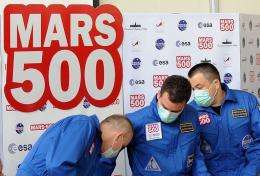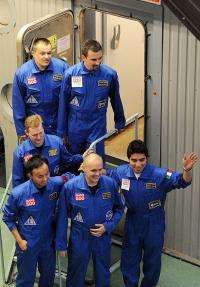Experiment volunteers 'to land on Mars'

A group of volunteers will on Saturday reach a key stage in an unprecedented one-and-a-half year experiment to study the effects of a mission to Mars when they "land" on the Red Planet's surface.
Three of the six volunteers will "touch down" on Saturday before moving out of their lander for a first "space walk" Monday on the Martian surface -- all without leaving a Moscow research centre.
The landing marks the approximate halfway point for the experiment in which the participants must spend 520 days in isolation from the world to test how humans would respond to the pressures of the long voyage to Mars.
The first steps on Mars of the three volunteers from Italy, Russia and China will be relayed to the flight control centre that monitors real space missions, as part of an experiment organised by the European Space Agency and Moscow's institute of biomedical problems.
A team of six men from Europe, Russia and China, has been locked since June in a mock-up spaceship to test the psychological effects of an 18-month round trip in the experiment, called Mars-500.
The volunteers aged from mid-20s to late 30s, among them engineers, doctors and a physicist, are crammmed into a mock-up spaceship just 20 metres long and less than four metres across.
Phone calls are barred, although e-mail and radio communication is allowed, with a time delay, and the men eat the same food in tubes as astronauts.
Russian Alexander Smoleyevsky, Italian Diego Urbina and Chinese Wang Yue are the three who will land on Mars while Romain Charles from France and Sukhrob Kamolov and Alexey Sitev from Russia "remain in orbit" on a different module.
With the world's media watching, Smoleyevsky and Urbina will don modified Russian Orlan spacesuits and exit the lander's airlock on Monday for the first of three space walks onto a simulated Martian surface next to their capsule.
They are then due to rejoin their three colleagues who stayed "in orbit" around the Red Planet on February 27.
For around a month, the crew will carry out scientific experiments in an environment designed to mimic that of Mars.The crew was deemed to have entered Mars's orbit on February 1.

The organiser at the European Space Agency, Jennifer Ngo-Anh, insisted that the virtual astronauts take their work very seriously. "They will do everything as in a real Mars mission," she told AFP.
"Of course, during a real trip to Mars, there are additional, other challenges that we have to address, for example: gravity and the problem of radiation."
Despite the monotony and close quarters, the crew members were "highly motivated and enthusiastic," she said, adding that none had suffered any medical problems.
Their space ship is due to take off from Mars on February 23 and to "land" back on Earth in November, ending 520 days of isolation.
The same Moscow institute earlier carried out experiments on the effects of prolonged weightlessness in which volunteers spent a week lying in a bath. Last year, six volunteers simulated spending 105 days in a space flight.
Russia plans to send a real flight to Mars in 20-30 years, possibly in a joint effort with US space agency NASA.
(c) 2011 AFP




















